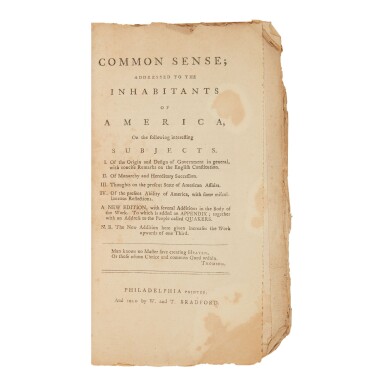PAINE, Thomas. Common Sense; Addressed to the Inhabitants of America, on the following interesting Subjects... Printed Philadelphia. Re-printed Newburyport: John Mycall, [1776].
PAINE, Thomas. Common Sense; Addressed to the Inhabitants of America, on the following interesting Subjects... Printed Philadelphia. Re-printed Newburyport: John Mycall, [1776]. 8 o (200 x 130mm). Half-title. [A]-G 4 , H 3 . 61 (1)pp. "The American Patriot's Prayer" printed at end. Wrappers, remnants of original stitching, untrimmed (some soiling and spotting on half-title and title page; ink markings on half-title, general title and margin of D1). In a red morocco slipcase. Provenance : David Jackman (signature on title page); Henry Merrill Jackman (signature on [A]4). A 1776 EDITION OF COMMON SENSE (the sixth edition), the pamphlet that destroyed the majesty of the British throne in the minds of Americans and convinced them to fight for independence. Paine ridicules the very idea of monarchy, calling it "the most prosperous invention the Devil ever set on foot for the promotion of idolatry." He abolishes any lingering affection for a "mother country" that was shooting down American patriots and torching American towns. "Even brutes do not devour their young." Above all, he makes the notion of American independence seem natural--a matter of common sense. "There is something very absurd, in supposing a continent to be perpetually governed by an island...Every thing that is right or natural pleads for separation. The blood of the slain, the weeping voice of nature cries, 'tis time to part." Bernard Bailyn rightly calls Common Sense "the most brilliant pamphlet written during the American Revolution and one of the most brilliant pamphlets ever written in the English language" ( Faces of Revolution , p.67). Paine wrote the work at the encouragement of Benjamin Franklin and Benjamin Rush, and decided to publish it in pamphlet form with the Philadelphia printer Robert Bell, who agreed to split equally with him any profits from its sale. (Paine planned to contribute his share to the purchase of winter gloves for Washington's troops.) Bell's edition, consisting of 1,000 copies, went on sale on 10 January 1776 and was quickly sold out, but Bell insisted there were no profits to divide. Paine immediately republished the book, augmented by an appendix, with a rival Philadelphia firm, William and Thomas Bradford, whose edition of 7,000 copies appeared on 14 February 1776. Paine estimated that 120,000 copies sold in the first three months and as many as 150,000 may have sold by year's end. It is impossible to fix the precise date of this Newburyport edition, but we do know it appeared in two forms in 1776, one with the imprint of Samuel Phillips of Andover, and one with the imprint as here, for John Mycall, a Newburyport printer. It was probably issued early in the spring, since Paine invited other printers later in the summer to republish it, and it was instantly famous. Evans 14961; Howes P-17.
PAINE, Thomas. Common Sense; Addressed to the Inhabitants of America, on the following interesting Subjects... Printed Philadelphia. Re-printed Newburyport: John Mycall, [1776].
PAINE, Thomas. Common Sense; Addressed to the Inhabitants of America, on the following interesting Subjects... Printed Philadelphia. Re-printed Newburyport: John Mycall, [1776]. 8 o (200 x 130mm). Half-title. [A]-G 4 , H 3 . 61 (1)pp. "The American Patriot's Prayer" printed at end. Wrappers, remnants of original stitching, untrimmed (some soiling and spotting on half-title and title page; ink markings on half-title, general title and margin of D1). In a red morocco slipcase. Provenance : David Jackman (signature on title page); Henry Merrill Jackman (signature on [A]4). A 1776 EDITION OF COMMON SENSE (the sixth edition), the pamphlet that destroyed the majesty of the British throne in the minds of Americans and convinced them to fight for independence. Paine ridicules the very idea of monarchy, calling it "the most prosperous invention the Devil ever set on foot for the promotion of idolatry." He abolishes any lingering affection for a "mother country" that was shooting down American patriots and torching American towns. "Even brutes do not devour their young." Above all, he makes the notion of American independence seem natural--a matter of common sense. "There is something very absurd, in supposing a continent to be perpetually governed by an island...Every thing that is right or natural pleads for separation. The blood of the slain, the weeping voice of nature cries, 'tis time to part." Bernard Bailyn rightly calls Common Sense "the most brilliant pamphlet written during the American Revolution and one of the most brilliant pamphlets ever written in the English language" ( Faces of Revolution , p.67). Paine wrote the work at the encouragement of Benjamin Franklin and Benjamin Rush, and decided to publish it in pamphlet form with the Philadelphia printer Robert Bell, who agreed to split equally with him any profits from its sale. (Paine planned to contribute his share to the purchase of winter gloves for Washington's troops.) Bell's edition, consisting of 1,000 copies, went on sale on 10 January 1776 and was quickly sold out, but Bell insisted there were no profits to divide. Paine immediately republished the book, augmented by an appendix, with a rival Philadelphia firm, William and Thomas Bradford, whose edition of 7,000 copies appeared on 14 February 1776. Paine estimated that 120,000 copies sold in the first three months and as many as 150,000 may have sold by year's end. It is impossible to fix the precise date of this Newburyport edition, but we do know it appeared in two forms in 1776, one with the imprint of Samuel Phillips of Andover, and one with the imprint as here, for John Mycall, a Newburyport printer. It was probably issued early in the spring, since Paine invited other printers later in the summer to republish it, and it was instantly famous. Evans 14961; Howes P-17.












Testen Sie LotSearch und seine Premium-Features 7 Tage - ohne Kosten!
Lassen Sie sich automatisch über neue Objekte in kommenden Auktionen benachrichtigen.
Suchauftrag anlegen